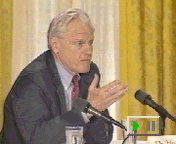

Select modem speed to see Video
VivoActive player required
Download Video (right mouse button)
in .viv format (~3.4 Mb)
Dr. Henry Kendall
|
(Nobel Laureate in Physics, 1990, Professor at Massachusetts Institute of Technology, Chairman of the Board of the Union of Concerned Scientists)
|
|
Mr. President, Mr. Vice President, thank you for this opportunity. Disruption of the climate is linked to, and can aggravate, many other human problems. One link I'd like to talk about is the connection with world food production. Agriculture, as is widel
y recognized, needs a stable climate in order to be highly productive. But in 1988, in the central North American continent, with combined high temperatures and drought, both Canada and the United States lost one-third of their grain supplies. For the fir
st time in 200 years, food production was not adequate to feed us. In the years since, Australia and Mexico have had somewhat similar events.
Food demand is expected to double in the next 30 years, which is almost no time at all. Fresh water, which is vital for irrigation, is already short. The human race uses nearly one half of the available fresh water, and 40 percent of the world's populatio n lives in areas that are water short. Expansion into new arable land is highly constrained, and the last thing we need are climatic changes and disruptions putting additional pressures on a system that is already becoming considerably stressed. Of course, it's the bottom tier of the developin g nations that will get hit directly by shortages. This has already started to generate increasing numbers of hungry migrants, environmental refugees, streaming across national borders. The result is that no nation will be sheltered from the effects of d islocations in food supplies, altered trade balances, and fresh water difficulties. The flow of migrants may increase into the hundreds of millions of people. And even though the wealthy nations will remain able to feed themselves, and remain well fed into the future, no nation will escape troubles from pressures on the foo d supply. Mr. President, it is ot the case that one end of the boat can sink, so let me say that this is a developing problem in national security, and we have to deal with it. The best way to deal with problems of this sort is to stop them at the outset and not wait until the results are presented to us and the great troubles have developed. Thank you.
|

To comment on this service,
send feedback to the Web Development Team.
![[White House icon]](/New/images/home_pin.gif)
![[Help Desk icon]](/New/images/help_pin.gif)